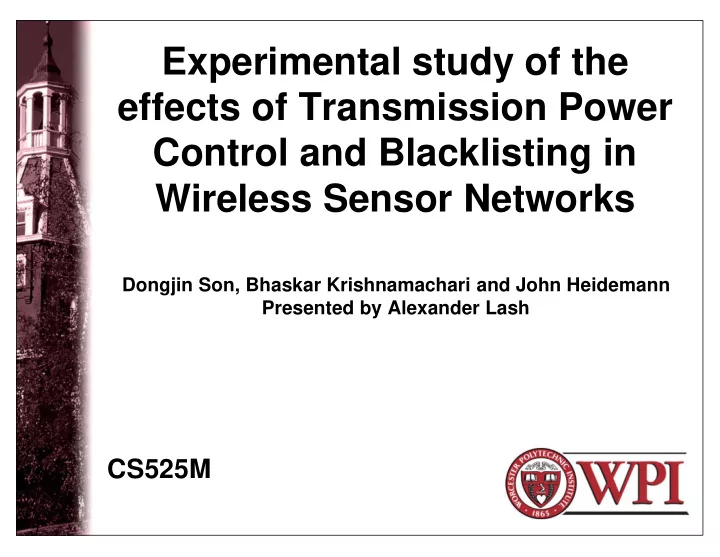

Experimental study of the effects of Transmission Power Control and Blacklisting in Wireless Sensor Networks Dongjin Son, Bhaskar Krishnamachari and John Heidemann Presented by Alexander Lash CS525M
Introduction • Low-power wireless channels – Susceptible to fading – Susceptible to interference • Prior research – Idealized assumptions • …leading to idealized simulations 2 Worcester Polytechnic Institute
Introduction • Consistent link quality – Transmission power control (TPC) – Link (and packet) blacklisting • Prior research – Power and capacity instead of reliability – Theoretical, not experimental 3 Worcester Polytechnic Institute
Background • Directed Diffusion Routing – Two-phase pull • Data sink sends interest • Sources reply with exploratory data • Sink returns positive/negative reinforcement • Positive path develops, returns data – One-phase pull • Sink sends interest • Source sends data 4 Worcester Polytechnic Institute
Directed Diffusion in Practice Weak = <90% PRR Good = >=90% PRR Asymmetric links are good in one direction. • One-phase pull: 43-58% Packet Reception Rate (PRR) • Two-phase pull: 72-83% PRR • Conclusion: unreliable links are worse than no links! – If a reliable route exists – …or can be created with TPC and blacklisting 5 Worcester Polytechnic Institute
Applying Transmission Power Control • Empowering a weak link… – …in sparse network, makes TX possible – …in a dense network • Tends to be cheap (dBm cost per PRR) • Tends to produce new weak links – Blacklisting solves this • Tends to reduce network capacity 6 Worcester Polytechnic Institute
One Receiver, Three Transmitters 7 Worcester Polytechnic Institute
One Transmitter, Three Receivers 8 Worcester Polytechnic Institute
Experimental Summary • Hardware Variation – Trivial at high power / close range – Significant at low power – Compensate with power control – Likely to get worse… • Cheap sensor fabrication 9 Worcester Polytechnic Institute
Wireless Link Distance • Indoor multi-pathing is a concern • New good links can be created 10 Worcester Polytechnic Institute
Node Positioning • Again, indoor multi-pathing means small movements can destroy links • Links can be regenerated with power control 11 Worcester Polytechnic Institute
Environment Over Time • Surrounding environment only affects the unreliable power range (-7 to 2 dBm) • Night graph (not shown) had almost no change 12 Worcester Polytechnic Institute
Defining Reactive Links • High PRR per dBm defines a reactive link • Reactive links are hit harder by environmental changes – …but environmental changes only affect transmissions in the unreliable range. 13 Worcester Polytechnic Institute
Summary So Far: Power Conquers All? 14 Worcester Polytechnic Institute
Proposed Approach: PCBL (Power Control and BlackListing) • TPC used to control link quality – Establish good links • Packet-based TPC – TX Power varies per packet • Depending on destination • Optionally, depending on QoS requirements • Metric-based link quality estimation – PRR, not distance, used to quantify • Blacklisting at adjusted power levels – Remove weak links created by increased power 15 Worcester Polytechnic Institute
PCBL (Optimize Before Routing) 1. Collect link statistics • A set of dBm:PRR measures for each link 2. Select a unicast TX power for each link • Lowest power that satisfies PRR minimum 3. Blacklist unreliable links • Or blacklist unreliable packet routes 4. Select a broadcast TX power • Highest TX power from step 2 5. Repeat at intervals to adjust to changes 16 Worcester Polytechnic Institute
M-BL (On-demand optimization) Maximum-BlackList 1. Collect link statistics at max. power 2. Blacklist unreliable links 3. Apply routing protocol to find path 4. Identify unicast transmission power (as in PCBL) along that path 17 Worcester Polytechnic Institute
Topology (Their mouse pointer, not mine) 18 Worcester Polytechnic Institute
Evaluating Metrics • M-BL versus PCBL – More stable PRR versus power and capacity conservation • The greatest gains in power conservation provide the highest standard deviations – Careful selection of blacklist thresholds is necessary 19 Worcester Polytechnic Institute
Results 20 Worcester Polytechnic Institute
Results Continued • M-BL provides a steep power increase for 0.5% gain • PCBL consumes more power per packet than TPP-P0 – …but fewer retransmissions even it out • Naively increasing power is counterproductive 21 Worcester Polytechnic Institute
Multi-Stream Results • M-BL loses ground – Increased transmission power consumes more network capacity – Dense sensor networks exacerbate this 22 Worcester Polytechnic Institute
Proposed Optimizations • Calculate link power on the fly – Adjust based on retransmission count – Adjust based on received signal strength change during data delivery • Use asymmetric links – Useful for propagating broadcasts that require no response – Requires packet-based, not link-based, blacklisting 23 Worcester Polytechnic Institute
Conclusions • Pre-set power levels cannot cope – Naïve power increases are counterproductive • M-BL may be optimal for some topologies and requirements • PCBL appears to be a more flexible solution – …which, given the nature of sensor networks, may be critical – PCBL’s concept of packet-based QoS may also gain relevance • Latency? 24 Worcester Polytechnic Institute
Questions? 25 Worcester Polytechnic Institute
Recommend
More recommend